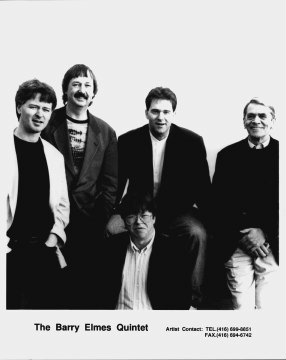
Vol. 1 no. 5
"The Toronto scene was a little too tight. I'm happy that in some small way Time Warp has had a hand in opening things up a little here."
 AW: What were the recordings
that had significant impact for you?
AW: What were the recordings
that had significant impact for you?
BE: Well, I already mentioned the Jazz at Massey Hall recording; that led me to a lot of Charlie Parker recordings. I have a huge Bird collection, one of the best collections there are of Bird stuff, both issued and unissued. I've stopped working on that collection, but it's still pretty good. That led me to other drummers that played with him.
I had favorite records, not so much to say "I'm trying to sound like this," but just that they spoke to me as wonderful things. Sonny Rollins Live at the Village Vanguard was one, an unbelievable record. The Mingus quartet records with Eric Dolphy and Ted Curson, and one tune in particular, Folk Forms, just because of the way it develops. That had a profound influence.
Last night, playing with Marian McPartland, she played something, and I found myself starting to play something that I remembered from that Mingus recording. It struck me that she was trying to build something just like in that piece. It's nice when you have the sounds in the back of your head, it's like a vocabulary. Somebody presses a button, and these options pop up, you think, "OK, this is the language being spoken now."
What else? Ellington at Newport, Bill Evans at the Vanguard, all the Charlie Parker records, all the Miles records, all the Jazz Messengers records, almost all of Coltrane's records, Soul Station by Hank Mobley, Ahmad Jamal at the Pershing Ballroom, there's zillions of them! I don't have any really bad jazz records, just a couple of strange ones, like my Screamin' Jay Hawkins record, a true party album if there ever was one!
When I moved to Toronto, the first thing I noticed was that there were these camps of musical taste. I'd been listening to Monk records and Mingus records and when I got here I thought, "Great, I'm going to get a chance to play all these tunes." Wrong! If there was a band with horns, then it had to sound like the Miles Davis Quintet; that's what everybody wanted to do. If it was a piano trio, it had to sound like Bill Evans and drummers were supposed to play like Paul Motian. The idea of playing like the Jazz Messengers just wasn't happening here. Eventually I went to a couple of sessions and it was the same there; everybody was playing Maiden Voyage. It almost became an attitude, a certain sound that was in. The idea of "Toronto time," where all the drummers had to play time like Tony Williams, on the front edge of the beat, I didn't like that. I didn't play that way, and I wasn't prepared mentally or technically to deal with the concept of every drummer trying to play way up on the time supposedly to make it exciting. There's nothing exciting about nervous time. .
AW: Did you ever talk to the representative Toronto drummers at that time about it?
BE: Yeah, and it wasn't a very cool thing to do. You don't talk to Terry Clarke about that, although being young and stupid, I did. Claude played like Claude, he just played. It wasn't just the drummers, it was also talking to pianists and bassists. I couldn't understand it at all. I barely knew Jerry Fuller at the time, and I asked him about it, and he said, "I've only started playing this way recently because I want to work." And I thought, where is the tribunal that decides this? Later on this problem worked out, because eventually a lot of other musicians felt the same way. It's all wonderful playing. I'm old enough now that I get these young guys coming up to me that tell me when they first came to Toronto they heard me play, and they talk about what I was doing.
While students at York we were a bit isolated, and so during
the day we spent a lot of time organizing what we wanted to learn to play.
Al Henderson was there; he was a big Mingus maniac, so we were doing a lot
of that music. We did older things too; we were playing Coleman Hawkins
tunes. You wouldn't dream of playing a gig at that time in Toronto and playing
a tune like Disorder From the Border . The Toronto scene was a little too
tight. I'm happy that in some small way Time Warp has had a hand in opening
things up a little here. You have to remember, Toronto has always acted
like a small town, regardless of its geographical size. There were a few
clubs that were being booked by one or two people. Most of these clubs featured
musicians who were part of the Boss Brass. Rob McConnell, Ed Bickert, Jerry
Toth, Eugene Amaro would do a week, and so it went. When we formed Time
Warp, we called Moe Koffman for a gig, and at first we couldn't get one,
and then we asked again and he finally let us have one. We were one of the
first real bands playing something other than the usual to play at George's.
By "real band", I simply mean that almost all the local jazz groups
appearing in Toronto clubs were put together for that one week gig. There's
nothing wrong with that, of course, it's just that Time Warp was an ongoing
real band. We played whether there were gigs or not. Apparently our entry
into George's had something to do with the manager, John Bowie, who had
heard the band and liked it.